初一下学期英语复习资料
七年级下学期英语复习资料

Unit 1 Can you play the guitar?短语:1、play the guitar2、play the drums3、play the piano4、play the violin5、play chess6、play basketball/tennis/volleyball/soccer/ping-pong7、want to do sth.8、want to join the art club9、English club10、art club11、music club12、chess club13、swimming club14、sports club15、soccer club16、story telling club17、tell a story = tell stories18、speak English/Chinese19、what about = how about20、be good at…+名词/V-ing21、be good with …sb.22、be good for…23、like to do sth./like doing sth.24、Let’s + V原形25、talk to sb.26、after school27、school show28、show sb.29、show me/us/them30、show sb. sth.= show sth. to sb.31、in the music room32、Come and show us!33、play games with sb.34、help (sb.)with sth.35、help sb. (to) do sth.36、make friends37、English-speaking38、call sb. at + 电话号码39、on weekends/on the weekend句型:1、—Can you swim?—Yes,I can./No,I can’t.2、—Can you play chess?—Yes,I can./No,I can’t.3、—Can you and Tom play chess?—Yes,we can./No,we can’t.4、—Can Jean and Jill swim?—Yes,they can./No,they can’t.5、—What can you do?—I can dance./ I can’t sing.6、—What club do you want to join?—We want to join the chess club.7、—What club does Lisa want to join?—She wants to join the chess club.Unit 2 What time do you go to school?短语:1、go to school2、go home3、get up4、go to bed5、get dressed6、brush teeth7、eat breakfast/lunch/dinner8、have breakfast …9、take a shower10、take a walk11、do my/your/his/her homework12、clean my room13、at half past six in the morning = at 6:30 a.m.14、at a quarter past three in the afternoon=at 3:15 p.m.15、at a quarter to seven in the evening = at 6:45 p.m.16、at a quarter to ten in the evening = at 9:45 p.m.17、an interesting job18、at a radio station19、radio show20、from … to…21、at night22、in the morning/afternoon/evening23、That’s a funny time for breakfast!24、It’s time for sth.25、go to work26、be late for school/work27、be never late for28、on school days29、your best friend30、go to bed early31、eat quickly32、play sports33、have much time for breakfst34、don’t/doesn’t have much time for breakfast35、half an hour36、for half an hour37、either … or …38、I either watch TV or play computer games.39、and then40、lots of … = a lot of … = man +可数名词的复数形式=much + 不可数名词41、be good for …42、be not good for …43、It tastes good.44、That sounds good.句型:1、—What time do you usually get up?—I usually get up at six thirty.2、—What time do they get dressed?—They always get dressed at seven twenty.3、—What time does Rick eat breakfast?—He eats breakfast at seven o’clock.4、—When does Scott go to work?—He always goes to work at eleven o’clock.5、—When do your friends exercise?—They usually exercise on weekends.Unit 3 How do you get to school?短语:1、get to= arrive in + 大地方arrive at + 小地点2、get to school3、get home/there/here4、take the trian5、take the bus6、take the subway7、ride a bike8、walk9、on foot10、by trian11、by bus12、by subway13、by bike14、how long15、how far16、how old17、how much18、how many19、be far from + 地点20、live far from + 地点21、be + 数量词+ away from …22、It takes sb. some time to do sth.23、20 minutes’ walk/drive24、every day25、I’m not sure.26、I don’t know.27、have a good day/time28、walk to school29、take the bus to school30、bus stop31、bus station32、trian station33、subway station34、It is + adj.(形容词) + to do sth.For many students, it is easy to get to school.35、between … and …36、go on a ropeway37、cross the rive to school38、one 11-year-old boy39、love to do sth.40、be like + 宾语41、be like a father to me42、many of + c.n.(pl.)(可数名词的复数形式) 谓语动词用复数43、come true句型:1、—How do you get to school?—I ride my bike. = I get to school by bike.2、—How does she get to school?—She usually takes the bus.= She usually gets to school bybus.3、—How long does it take to get to school?—It takes about 15 minutes.4、—How far is it from your home to school?—It’s only about two kilometers.5、—Does Jean walk to school?—No,she doesn’t.She goes by bike.6、—Do they take the bus to school?—No,they don’t.They walk.Unit 4 Don’t eat in class.短语:1、school rules2、arrive late for class3、be on time4、be on time for class5、in the hallways6、in the classroom7、in the dining hall8、listen to music9、in class10、wear a hat11、 a lot of rules12、be late for class13、be very important14、bring music player to school15、bring … to …16、have to17、wear the school uniform18、I see.19、be quiet20、in the library21、go out22、see friends23、do one’s (my/your/his/her) homework24、practice the guitar25、do the dishes26、watch TV27、help his mom make breakfast28、help sb. (to) do sth.29、clean his room30、on school days31、on school nights32、every Saturday/Sunday/morning/evening33、in the morning/afternoon/evening34、before breakfast/lunch/dinner35、after breakfast/lunch/dinner36、after class/school37、too many + c.n.(pl.)(可数名词的复数形式)38、too much + u.n(不可数名词)39、much too + adj.(形容词)40、make one’s (my/your/his/her) bed41、leave the dirty dishes in the kichen42、leave … in …43、run to school44、be noisy45、read a book46、think about47、 a lot of things48、be strict (with sb.)49、make rules50、follow the rules= obey the rules51、break the rules52、Good luck!句型:1、Don’t run in the hallways.2、Don’t fight.3、Don’t talk.4、Don’t eat.5、Don’t listen to music.6、Don’t take a picture.7、—What are the rules?—We must be on time for class.8、—Can we eat in the classroom?—No,we can’t.,but we can eat in the dining hall.9、—Can we wear a hat in class?—Yes,we can./No,we can’t.10、—Does he have to wear a uniform at school?—Yes,he does./No,he doesn’t. 11、—What can you have to do?—We have to be quiet in the library. 12、—Can Dave go out on school days?—No,he can’t.Unit 5 Why do you like pandas?短语:1、Welcome to the zoo.2、Let’s see the pandas.3、let’s do (动词原形) sth.4、want to do sth.5、be cute/interesting/fun/smart/lazy/beautiful6、be really scary/cute/cool7、be kind of interesting8、be kind of + adj.(形容词)9、be very + adj.(形容词)10、be very cute11、be from= come from12、walk on two legs13、all day14、all night15、That’s a good name for …(+ 人称代词宾格)16、like … a lot= like … very much17、be in (great) danger18、students from Thailand19、save the elephants20、one of the …+ c.n.(pl.)(可数名词的复数形式)谓语动词用单数21、 a symbol of …22、 a symbol of good luck23、draw very well24、walk for a long time25、get lost= be lost26、places with food and water27、help sb.(to) do sth.28、cut down29、cut down many trees30、kill … for…31、be made of …32、things made of ivory33、so many …34、live in …35、be five years old句型:1、—Let sb. do sth.肯定回答:OK./All right./Good idea./That soundsgood/great/interesting…否定回答:Sorry,I …2、—Why do you like pandas?—Because they’re kind of interesting.3、—Why does John like koalas?—Because they’re very cute.4、—Why don’t you like tigers?—Because they’re really scary.5、—Where are lions/koalas/pandas from?—They’re from South Africa/Australia/China.6、I like pandas because they’re very cute.7、I like … because …8、I don’t like tigers because they’re lazy.9、I don’t like … because …10、—What animals do you like?—I like elephants.11、—Isn’t she beautiful?—Yes,she is.No,she isn’t.Unit 6 I’m watching TV.短语:1、watch TV2、read a newspaper/book3、talk on the phone4、listen to a CD5、use the computer6、make soup7、wash the dishes8、be kind of9、TV show10、want to do sth.11、go to the movies12、That sounds good.13、wash one’s clothes14、join sb.for…15、at home16、eat out17、I’d love to.18、Let’s meet at my home first.19、See you then.20、in a river21、in a pool22、make zongzi23、host family24、think of/about25、today’s story26、 a student from…27、the United States/the US/the USA28、live with sb.29、an American family30、Dragon Boat Festival31、watch the boat races on TV32、the night before the festival33、be like34、any other night35、one … the other…36、some … others…37、the others38、read a story to…39、watch a soccer game40、talk on the phone to…41、wish to do sth.42、like … a lot = like … very much43、 a picture of my family44、in the living room45、listen to the radio46、talk show47、study for a test句型:1、—What are you doing?—I’m watching TV.2、—What’s she doing?—She’s washing her clothes.3、—What are they doing?—They’re listening to a CD.4、—Are you doing your homework?—Yes,Iam./No,I’m not.I’m cleaning my room.5、—Is he reading a newspaper?—Yes,he is./No,he isn’t.He’splaying basketball.6、—Are they using the computer?—Yes,they are./No,they aren’t.They’re exercising.7、She’s exercising now.8、She exercises on Mondays/every night/in the mornings….现在进行时的关键词:now/right now、look、listen、It’s …o’clock.、根据上下文语境判断一般现在时的关键词:always、usually、often、sometimes、never(频率副词)every day/Monday/Saturday/morning/evening/week/every month/yearin the morning/afternoon/eveningon Mondays/Sundays、on weekensafter breakfast/lunch/dinnerUnit 7 It’s raining!短语:1、in Shanghai/Beijing/Nanjing 在上海/北京2、in Moscow/Toronto/Boston 在莫斯科/多伦多/波士顿3、play computer games4、play basketaball5、watch TV6、play…with…7、at the park/in the park8、sound like9、have a good time10、at home11、at one’s friend’s home12、take a message (for sb.)13、tell sb. to do sth.14、call sb. back15、right now = now16、study English/Chinese17、make soup18、every day19、have a good time doing sth.20、visit sb.21、in Canada22、go to summer school23、a lot24、learn a lot25、some of…26、be happy to do sth.27、by the pool28、orange juice29、See you soon!30、summer vacation31、study hard32、have fun33、have a great time34、in Europe35、on a vacation36、in the mountains37、write to sb.38、just right fo sth./doing sth.39、See you next month!40、wear hats41、in the snow42、on a river43、take a photo/picture (of…)句型:1、—How’s the weather?= What’s the weather like?—It’s cloudy/sunny/raining/rainy/windy/snowy.2、—What are you doing?—I’m cooking.3、—What are they doing?—They’re playing basketaball in the park. 4、—What’s he doing?—He’s studying at his friends’ home. 5、—How’s it going?—Great!/Not very good./Not bad./Terrible! 6、—Could you just tell him to call me back?—Sure,no problem.7、It’s hot in your country now, isn’t it?Unit 8 Is there a post office near here?短语:1、post office2、police station3、pay phone4、on Bridge Street5、near…6、across from7、next to…8、between …and…9、in front of10、behind 11、excuse me12、How can I help you?/Can I help you?13、in town14、on Center Street15、not too far from16、walk with…17、go along/down18、walk along/down19、turn right20、turn left21、on the right22、on the left23、at the first crossing24、on one’s right25、on one’s left26、clothes store27、bookstore28、in my neighborhood29、like to do sth./doing sth.30、spend time31、on weekends32、love to do sth.33、watch…doing sth.34、watch…do sth.35、look like36、walk out37、live in a noisy neighborhood38、enjoy doing sth.39、enjoy reading40、get to…41、get to school/the library42、get home/there/here43、go shopping44、climb the trees45、spend weekends句型:1、there be 句型“表示某地有某物/人”There is/are + 某物/人+ 地点状语.There is/are not …①—Is there a/an + 单数名词+ 地点状语?—Yes,there is./No,there isn’t②—Are there + 名词的复数+ 地点状语?—Yes,there are./No,there aren’t2、—Is there a hospital near here?—Yes,there is.It’s on Center Street.3、—Are there any reataurants near here?—Yes,there’s one in front of the post office.4、—Where’s the hotel?—It’s behind thepolice station.5、—Where’s the bank?—It’s next to the post office.6、—Where’s the park?—It’s across from the bank,behind the hotel.7、—Where are the pay phones?—They’re between the post office and the library.8、—Is it on Bridge Street?—Yes,it is./No,it isn’t.9、—Is it next to the police station?—Yes,it is,/No,it isn’t.10.—Thank you very much./Thanks so much.—You’re welcome./No,problem./That’s all right.11、To get there,I usually walk out and turn right on BridgeRoad.12、The best things in life are free.13、When I read books,time goes quickly!Unit 9 What does he look like?短语:1、look like2、short hair3、long hair4、curly hair5、straight hair6、be of medium height7、be of medium build8、a little9、a little late10、may be11、brown hair12、black hair13、wear glasses14、See you later then.15、be really handsome16、 a big nose17、 a small mouth18、 a roud face19、blonde hair20、big eyes21、 a long face22、short curly brown hair23、tall and thin24、an interesting job25、 a police artist26、talk to sb.27、draw a picture (of…)28、put … in…29、put … on …30、put … down …31、put … away …32、put … up …33、want to do sth.34、in the same way35、long straight brown hair36、be thirty years old37、thirty-year-old38、in the end = at last39、first of all,40、wear jeans41、sports shoes42、be good at43、be good for44、be good with句型:1、—What does he look like?—He’s really tall./He’s short./He’s of medium height.2、—What does she look like?—She has long straight hair/short hair/curly hair/brownhair/black hair.3、—What do they look like?—They’re of medium build.4、—Do they have straight or curly hair?—They have curly hair.5、—Is he tall or short?—He isn’t tall or short.He’s of medium height.6、They tell him what the criminal looks like.7、Many people don’t always see things the same way so theymay describe the same person differently.Unit 10 I’d like some noodles.短语:1、would like2、I would like… = I’d like…3、He/She would like… = He’d/She’d like …4、would like sth.5、would like to do sth.6、beef/mutton/chicken noodles7、one/a (large) bowl of …8、two bowls of …9、May I take/have your order?10、take noe’s order11、That’s right.12、tomato and egg rice13、beef and carrot noodles14、green tea15、orange juice16、around the world17、would like to do sth.= want to do sth.18、on one’s birthday19、be different20、in different countries21、in many countries22、birthday cakes with candles23、the mumber of …+ c.n.(pl.)(可数名词的复数形式)谓语动词用单数24、 a (large/small) number of … + c.n.(pl.) 谓语动词用复数25、make a wish26、blow out27、blow out the candles28、in one go29、come true30、in the UK31、be lucky32、good luck33、in China34、get popular35、cut up36、cut down37、 a symbol of long life38、bring good luck to …39、different kinds of …40、all kinds of …句型:1、—What would you like?—I’d like some nooles.2、—What kind of noodles would you like?—I’d like beef/mutton/chicken noodles,please.3、—What size would you like?—I’d like a large/medium/small bowl,please. 4、—Would you like a large bowl?—Yes,please./No,thanks.5、—Is there any meat in the tomato and egg soup?—Yes,there is.No,there isn’t any./No,there’s no meat. 6、—Are there any vegetables in the beef soup?—Yes, there are some tomatoes.No,there aren’t any.Unit 11 How was your school trip?短语:1、school trip2、go for a walk = take/have a walk3、milk a cow4、ride a horse5、feed chickens6、talk with a farmer7、take a photo/picture (of + 拍摄的对象)take photos/pictures (of …)8、quite a lotquite a lot of …9、grow apples10、ask some questions11、show sb. around12、from … to …13、take … home14、pick strawberries15、last week 16、be excellent17、in the cuntryside18、every day19、go fishing20、go swimming21、go skating22、go shopping23、so much fun24、so clean25、so beautiful26、so fast27、Lucky you. = You’re so lucky.Luck me.Luck him/her.28、go to the zoo29、go to the farm30、go to the countryside31、go to an art museum32、visit a museum33、visit a fire station34、climb a mountain/the mountains35、draw pictures36、come out37、sience musem38、along the way39、at the musuem40、play chess with …41、how to make a model robot42、the gift shop43、be expensive/cheap44、All in all, …45、an exciting day46、be interested in …sth./doing sth.47、It is + adj.(easy/difficult…) + to do sth.48、not … at all句型:1、—How was your school trip?—It is great.2、—Did you go to the zoo?—No, I didn’t. I went to a farm.3、—Did you see any cows?—Yes, I did. I saw quite a lot.4、—Did Carol ride a horse—No, she didn’t. But she milked a cow.5、—Were the strawberries good?6、—Yes, they were./No, they weren’t.Unit 12 What did you do last weekend?短语:1、last weekend2、do one’s homework3、go to the cinema4、go boating5、camp by the lake6、go to the beach7、play badminton8、on Saturday morning9、study for …English/math10、visit my grandparents11、feed sheep/cows12、work as a guide13、the Natural History Musuem14、How interesting!15、a butterfly house with over 200 kinds of butterflies16、tell sb. about sth.17、living habits18、kind of tired19、stay up20、stay up late to watch the soccer game21、play with sb.22、study for a test23、have dinner with friends24、go to the library25、fly a kite/kites26、swim in a swimming pool27、anything interestingsomething interestingsomething important28、be afraid of …29、a weekend to remember30、high school31、two weeks ago32、as a special gift33、take sb. to sp.34、go camping35、go shopping36、go fishing37、go skating38、go boating39、go swimming40、put up41、put up the tents42、make a fire43、keep … warm44、cook food on the fire45、on the first night46、sit under the moon47、each other48、so … that …49、the next morning50、look out of …51、get a terrible surprise52、see … do sth.see … doing sth.53、shout at …shout to …54、know about …55、start to do sth.56、up and down57、jump up and down58、wake … up59、move into …60、feel … doing sth.61、It is important to do sth.It is important not to do sth.句型:1、—What did you do last weekend?—I did my homework./We went boating.2、—Who visited her grandma?—Becky did.3、—Where did she go last weenkend?—She went to a farm.4、—Who did she go with?—She went with her classmates.把下列可数名词单数变为复数形式:guitar musician bus chess dress subway club brush bike story shower minute show job kilometer drum station car piano exercise river violin group village home quarter bridge friend life boat center trian ropeway year hotel beach villager restaurant butterfly dream bank visitor rule hospital mouse hallway street baby uniform town language dish road kite kichen cinema tentzoo glass surprise panda actor eartiger actress tooth elephant person message koala nose problem lion mouth vacation giraffe face mountain animal eye country pet singer snowman leg artist farmer cat criminal flower symbol way museum flag noodle robot place negro gifttree hero lake ivory tomatonewspaper potatomovie specialhouse bowlpool dumplingshop onionsupermarket carrotman cakewoman candlerace candyhost ideastate cowchild horsepark chicken 将下列动词按要求变化形式:V动词原形V第三人称单数形式V-ing动词的ing形式V-ed 动词的过去式bedocomehavegogetwantliketakemakeplayputreadriderelaxrunshopsoundsingdancedrawspeakstudyswimteachtellusevisitwearwashwishworkwriteanswerarriveblowbringbrushcallcampcleanclimbcookcrosscutdanceV动词原形V第三人称单数形式V-ing动词的ing形式V-ed 动词的过去式describedrawdreamdressdrinkdriveeatenjoyexercisefarmfeedfeelfightfishflyfollowforgetgrowhearhelpjoinjumpkeepkilllearnleavelistenlivemilkmissmoveorderpaypickpracticerainremembersaveshoutshowsitskatesleepsnowspendstartstayV动词原形V第三人称单数形式V-ing动词的ing形式V-ed 动词的过去式stopsurprisetalktastetellthinkturnwakewalkworry不规则则动词的过去式:见课本P142V V-e过去式V V-ed过去式am/is letare losebring makebuy meetcome paycut putdo/does readdraw ridedrink rundrive sayeat seefeed sellfeel singfight sitfind sleepfly speakforget spendget standgo swimgrow takehave/has teachhear tellkeep thinkknow wakeleave wearwrite 情态动词:+ V原形canmusthave/has to (有人称、数和时态的变化,否定句和疑问句需要借助助动词do/does/ don’t/doesn’t,did/didn’t)couldmaywill把下列动词变为名词:把下列名词变为形容词:把下列形容词变为副词:work rain quickclean wind easyfarm cloud differentwrite snow luckysing luckmusicartvisit以ly结尾但词性为形容词的词:friendlylovely副词、形容词都是同一个的词:earlyFast不规则变化:manwomanchildtoothfootmouse单复数同形:fish(鱼)sheep(绵羊)deer(鹿)ChineseJapanese单数形式复数概念:people(人们)police(警察)family(家人)不可数名词:(1)可食用的肉:meat、beef、mutton、chicken、pork(2)液体:milk、water、drink、juice、tea、coffee、soup(3)具体的某种语音:English、Chinese(4)某些食物:rice、bread、porridge(5)个别单词:work、homework、money、hair、air、sunshine世界上独一无二的事物要用定冠词the 来修饰:the sunthe moonthe same某些表示感觉或状态的动词通常不用于现在进行时态,如:likehateliveseehearknowwantneedsound。
人教版七年级下册英语期末复习:Unit 7-Unit 12 各单元语法知识点复习提纲(全面!)
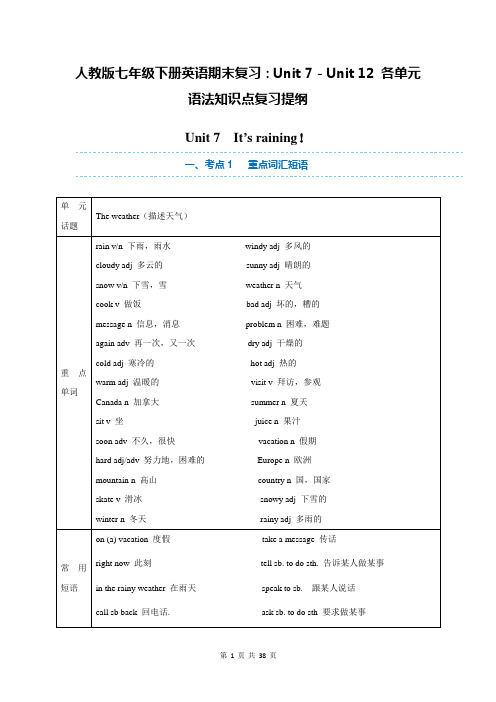
人教版七年级下册英语期末复习:Unit 7-Unit 12 各单元语法知识点复习提纲Unit 7 It’s raining!一、考点1 重点词汇短语1 messagemessage为可数名词,意为“消息,信息”,take a message for sb.“为某人捎个口信”。
拓展:give sb. a message 捎信给某人,leave a message 留口信,get the message 明白对方的意思。
Can I take a message for him?当某人发现要找的人不在或接电话的人发现打电话者要找的人不在时,常用此语2 could 情态动词意为“能,可以“,表示请求许可,在语气上比can委婉客气,但这种句式的肯定回答用can。
Could you just tell him to call me back?3 call及物动词,意为“打电话给”。
call sb. (up) “打电话给某人”,call sb. at +电话号码,意为“拨打……找某人”。
拓展:call 是一个多义词,call sb 可表示“叫醒某人,呼唤某人”;give sb. a call 给某人打电话。
4 back副词“回来,回原处,向后”;call sb. back给某人回个电话。
【即学即练】I’ll _____you _____.我将给你回电话。
5 visit此处用作及物动词,意为“拜访,探望”,后接表示人的名词或代词。
visit还可意为“参观,游览”,后接表示地点的名词。
拓展:visit还可用作可数名词,意为“访问,参观,拜访。
be on a visit to ... “正在访问/参观……”。
visitor参观者,游览者,游客。
I’m having a great time visiting my aunt in Canada._____ my grandparents every year at Christmas.我每年圣诞节都去探望我的祖父母。
七年级英语人教版(新目标)(最新版)下学期期末复习:知识点归纳
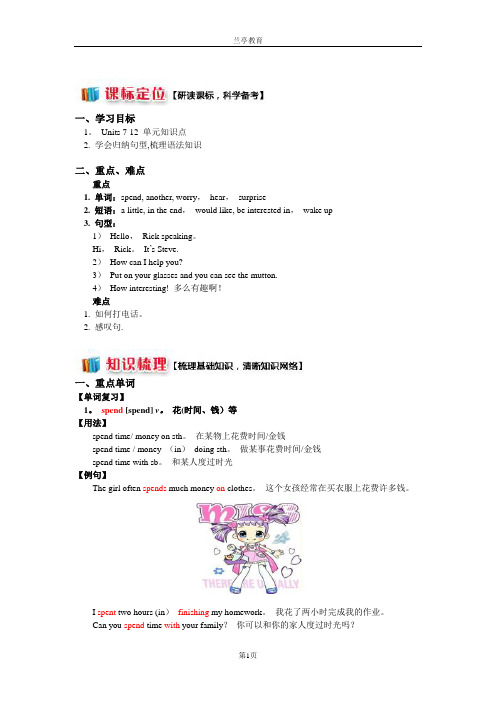
一、学习目标1。
Units 7-12 单元知识点2. 学会归纳句型,梳理语法知识二、重点、难点重点1. 单词:spend, another, worry,hear,surprise2. 短语:a little, in the end,would like, be interested in,wake up3. 句型:1)Hello,Rick speaking。
Hi,Rick。
It’s Steve.2)How can I help you?3)Put on your glasses and you can see the mutton.4)How interesting! 多么有趣啊!难点1. 如何打电话。
2. 感叹句.一、重点单词【单词复习】1。
spend [spend] v。
花(时间、钱)等【用法】spend time/ money on sth。
在某物上花费时间/金钱spend time / money (in)doing sth。
做某事花费时间/金钱spend time with sb。
和某人度过时光【例句】The girl often spends much money on clothes。
这个女孩经常在买衣服上花费许多钱。
I spent two hours (in)finishing my homework。
我花了两小时完成我的作业。
Can you spend time with your family?你可以和你的家人度过时光吗?【拓展】(1) pay常用来表示“付款”,主语是人,其后用介词for。
sb。
pays money for sth. = sb。
spends money on/ doing sth。
(2)cost 表示“花钱”,主语为物。
sth。
costs sb. money. = sb. pays money for sth。
= sb。
spends money on/(in)doing sth。
【英语】七年级英语下学期期末复习Units910单元语法及练习人教新目标版
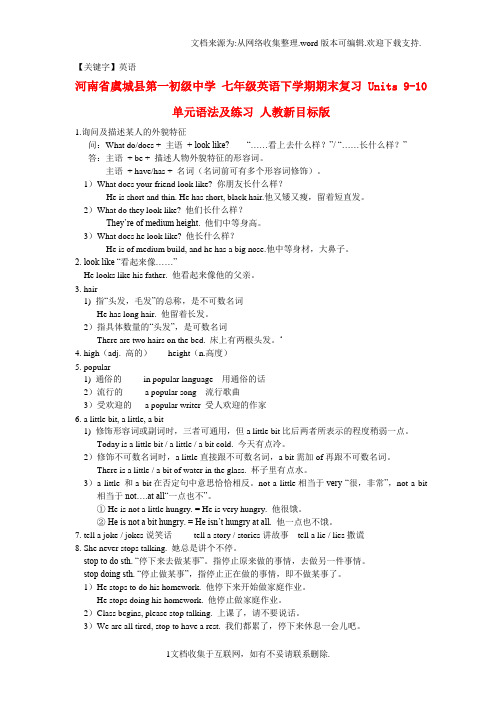
【关键字】英语河南省虞城县第一初级中学七年级英语下学期期末复习 Units 9-10单元语法及练习人教新目标版1.询问及描述某人的外貌特征问:What do/does + 主语+ look like? “……看上去什么样?”/ “……长什么样?”答:主语+ be + 描述人物外貌特征的形容词。
主语+ have/has + 名词(名词前可有多个形容词修饰)。
1)What does your friend look like? 你朋友长什么样?He is short and thin. He has short, black hair.他又矮又瘦,留着短直发。
2)What do they look like? 他们长什么样?They’re of medium height. 他们中等身高。
3)What does he look like? 他长什么样?He is of medium build, and he has a big nose.他中等身材,大鼻子。
2. look like “看起来像……”He looks like his father. 他看起来像他的父亲。
3. hair1) 指“头发,毛发”的总称,是不可数名词He has long hair. 他留着长发。
2)指具体数量的“头发”,是可数名词There are two hairs on the bed. 床上有两根头发。
‘4. high(adj. 高的)----- height(n.高度)5. popular1) 通俗的in popular language 用通俗的话2)流行的 a popular song 流行歌曲3)受欢迎的 a popular writer 受人欢迎的作家6. a little bit, a little, a bit1) 修饰形容词或副词时,三者可通用,但a little bit比后两者所表示的程度稍弱一点。
初一年级英语考试必备的复习材料推荐

初一年级英语考试必备的复习材料推荐在初一年级的英语学习旅程中,复习材料的选择至关重要。
作为一名热爱知识的小助手,我将为你推荐一些必备的复习材料,助你在英语考试中取得好成绩。
首先,课本是最基础也是最重要的复习材料。
每一页的内容都蕴含着老师精心设计的教学目标和知识框架。
课本中的单词、短语和句型构成了学生们学习英语的基石。
通过仔细阅读课本,学生能够深入理解课文的主题、结构和语言运用。
这不仅有助于提升阅读理解能力,也为后续的写作打下良好的基础。
接下来,练习册是同学们不可或缺的好伙伴。
通过练习册上的各种习题,学生可以巩固课堂所学,查漏补缺。
同时,练习册中的听力材料也能帮助学生提高听力水平。
定期完成练习,不仅能提升解题技巧,还能让学生在考试时更加从容不迫。
除了课本和练习册,网络资源也极具价值。
互联网为学生提供了丰富多彩的学习平台,从视频教程到在线测验,应有尽有。
Y ouTube上有许多教育频道,提供生动有趣的英语学习视频,能够帮助同学们加深对语法、词汇和发音的理解。
与此同时,各类英语学习应用程序,如Quizlet和Duolingo,也为学生提供了便利的学习方式。
通过这些工具,学生可以随时随地进行单词记忆和语法练习,充分利用碎片时间。
当然,词汇表是复习过程中必不可少的工具。
初一年级的英语词汇量不断增加,制作一个个人词汇表,有助于记忆和复习。
将生词分类,比如按主题、词性等整理,可以让复习过程更有条理。
每天抽出时间来背诵和复习这些词汇,能够有效提高语言运用能力,为考试做好准备。
对于喜欢阅读的同学,英文读物也是一个很好的复习材料。
选择适合自己水平的原版书籍或简易读物,能够在愉悦的阅读过程中提高阅读能力和词汇量。
故事中的情节和人物会让学生更加投入,增强学习的乐趣。
同时,读书还能提高写作能力,通过模仿书中的句子结构和表达方式,学生可以培养自己的写作风格。
此外,参加英语角或交流活动也是提升英语水平的重要途径。
在这些活动中,学生可以与其他同学进行口语练习,锻炼自己的表达能力和听力理解。
人教版七级下英语Unit 4 Dont eat in class单元知识复习总结
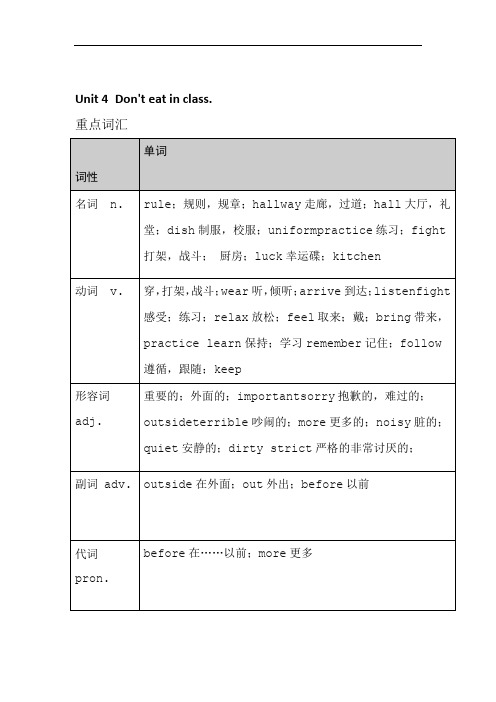
Unit 4Don't eat in class. 重点词汇重点短语Section A1.in class在课堂上2.arrive late for class=be late for class上课迟到3.on time准时4.in the hallways在走廊里5.in the dining hall在餐厅里6.listen to听7.at school在学校8.be late迟到9.music player音乐播放器10.bring...to school 把……带到学校来不得不做have to do.11.12.wear a school uniform穿校服13.be quiet安静Section B14.go out外出15.on school nights在上学期间的晚上16.practice the guitar练吉他17.do the dishes清洗餐具18.make breakfast做早饭19.make one's bed整理床铺20.leave sth.in...把……丢在……里21.read a book看书22.think about考虑23.make rules制订规则24.follow the rules遵守规则25.Good luck!祝好运!26.keep sth.+adj.使……保持……状态重点句型1.Don't eat in class.在课堂上不准吃东西。
2.Don't arrive late for class.You must be on time.不准上课迟到,务必守时。
3.Don't run in the hallways.不准在走廊内乱跑。
4.Don't eat in the classroom.You must in the dining hall.不准在教室里吃东西,务必在餐厅里吃东西。
5.Don't listen to music in class.不准在课堂上听音乐。
七年级英语下册复习资料(最全面)
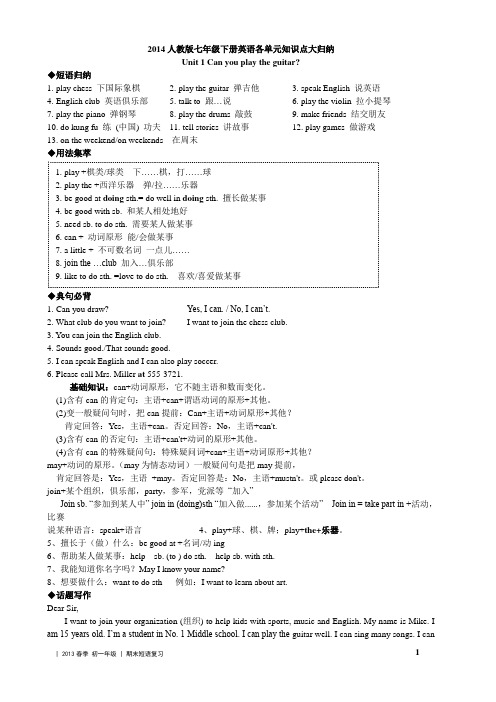
2014人教版七年级下册英语各单元知识点大归纳Unit 1 Can you play the guitar?◆短语归纳1. play chess 下国际象棋2. play the guitar 弹吉他3. speak English 说英语4. English club 英语俱乐部5. talk to 跟…说6. play the violin 拉小提琴7. play the piano 弹钢琴 8. play the drums 敲鼓9. make friends 结交朋友10. do kung fu 练(中国) 功夫11. tell stories 讲故事12. play games 做游戏13. on the weekend/on weekends 在周末◆用法集萃1. play +棋类/球类下……棋,打……球2. play the +西洋乐器弹/拉……乐器3. be good at doing sth.= do well in doing sth. 擅长做某事4. be good with sb. 和某人相处地好5. need sb. to do sth. 需要某人做某事6. can + 动词原形能/会做某事7. a little + 不可数名词一点儿……8. join the …club 加入…俱乐部9. like to do sth. =love to do sth. 喜欢/喜爱做某事◆典句必背1. Can you draw? Yes, I can. / No, I can‘t.2. What club do you want to join? I want to join the chess club.3. You can join the English club.4. Sounds good./That sounds good.5. I can speak English and I can also play soccer.6. Please call Mrs. Miller at 555-3721.基础知识:can+动词原形,它不随主语和数而变化。
英语复习资料七下

英语复习资料七下中学阶段是每个人求学路程中非常重要的一个时期,为了取得更好的学业成绩,每个学生都需要充分准备考试,并且掌握良好的学习方法。
而英语作为世界上比较通用的语言,是每个学生必须掌握的技能之一。
如何备考英语呢?本篇文章针对七年级下学期的英语学习内容,整理了一些复习资料,供大家参考。
词汇与语法单词和语法是学习英语最基本的部分。
七年级下学期的重点内容包括动词的时态,一些常用的词汇例如数字,家庭成员,食品等等。
建议同学备考时可以使用红宝书或者蓝宝书进行重点复习。
阅读理解除了要记单词和学习语法外,阅读理解也是英语学习的重中之重。
英语阅读理解需要进行全面和深入的理解,建议同学们多读短文和长篇阅读材料,并在阅读中积累常用的短语和表达。
听力英语口语和听力是英语学习的另两个基本部分。
为了提高自己的听力能力,建议同学们多听一些英语歌曲,广播,电视节目或者相应的录音资料。
听力训练对于掌握英语发音,语速和表达方式都非常有帮助。
其他学习资源英语作为全球通用的语言,对于学生来说相关的学习资源也非常丰富。
学习英语需要使用不同的方法和资源,以便更好更轻松地掌握语法,单词和其他各种技能。
一些有用的学习资源如下:1. Duolingo –免费的在线语言学习工具。
2. 学而思网校–一个提供在线辅导和备考材料的大型教育品牌。
3. Quizlet –一款免费的在线外语学习应用,集合了语法,单词,口语等等学习资源。
4. YouTube –在YouTube上有各种英语学习频道,学生们可以订阅来获得有用的学习技巧,并且通过评论和点赞让其他同学互相交流。
总之,英语学习需要坚持不懈的练习和学习,并且积累巨大的时间和精力。
掌握好基本的语法和单词,经常进行语言的实践和交流,还有选择合适的学习资源,都是取得好成绩的关键。
牛津译林版英语七年级下册units5-8期末复习重点知识点总结和试卷
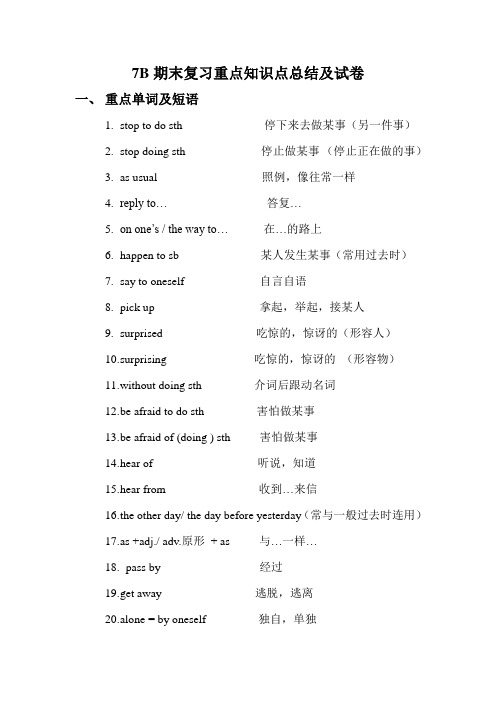
7B期末复习重点知识点总结及试卷一、重点单词及短语1.stop to do sth 停下来去做某事(另一件事)2.stop doing sth 停止做某事(停止正在做的事)3.as usual 照例,像往常一样4.reply to…答复…5.on one’s / the way to…在…的路上6.happen to sb 某人发生某事(常用过去时)7.say to oneself 自言自语8.pick up 拿起,举起,接某人9.surprised 吃惊的,惊讶的(形容人)10.s urprising 吃惊的,惊讶的(形容物)11.w ithout doing sth 介词后跟动名词12.b e afraid to do sth 害怕做某事13.b e afraid of (doing ) sth 害怕做某事14.h ear of 听说,知道15.h ear from 收到…来信16.t he other day/ the day before yesterday(常与一般过去时连用)17.a s +adj./ adv.原形+ as 与…一样…18.pass by 经过19.g et away 逃脱,逃离20.a lone = by oneself 独自,单独21.t hrough 穿过,通过(空间)go through 通过…22.p ut up 搭,竖立23.c entury ----centuries 世纪,百年24.e xcited/exciting 分别形容人和物25.e nough 足够的(放于名词前,形容词后)be enough to do sth26.t oo… to太…而不能…27.d ecide to do sth 决定做某事28.r each sth 伸手(脚)够到29.f ail to do sth 做某事失败30.s end sb sth= send sth to sb 发送…给…31.b e able to do sth= can/could 能/会做某事32.p ay for…为…付款33.r aise sth for sb 为…筹集/募集…34.r aise sth to do sth 募集…做某事35.s ave…from…从…救出…36.b e badly hurt 伤的很重37.p rotect…from doing sth保护…免于….38.p ut it out 把它扑灭(代词放中间)39.i n hospital 住院40.i n the hospital 在医院41.n od—nodded (过去式)点头42.n ews (不可数) 新闻,消息43.b y the way 顺便说说44.n o problem 没问题45.d o/try one’s best to do sth尽某人最大努力做某事46.c areful---careless(反义词)47.d o well in doing=be good at doing sth 擅长做某事48.a t the age of…在…岁的时候49.r ecommend sb for…推荐某人获得…50.t ake part in 参加(节目,游戏,活动)51.l ose one’s way = get lost迷路52.t each sb (代词用宾格)sth 教…(代词用宾格)53.t each sb to do sth 教某人做某事54.b ark at sb 对某人叫/吠55.l ook after…well=take good care of…照顾好…56.h ave trouble doing sth 做某事很困那/麻烦57.a ll the time 一直,总是58.a gree with sb 同意某人的观点agree to do sth 同意做某事59.w eigh up to…重达…60.g row up 成长,长大61.t alk= speech 演讲(可数)62.n oisy---noisily adv. 嘈杂的/地(变y为i加ly)期末复习试卷一、单项选择1. She is 11-year-old girl and enjoys playing chess.A. an; anB. a; theC. an; /D. the; /2. Everybody is too tired. Let's a rest.A. stop havingB. to stop havingC. stop to haveD. stop to have3. He was to hear of the news this morning.A. surprising; surprisedB. surprised; surprisingC. surprised; surprisedD. surprising; surprising4.She met her old friend the other day.A. on her way to homeB. on her way homeC. in my way homeD. in my way to home5.The big fire in Australia was at last.A. put inB. put outC. put upD. put down6.Lots of students couldn’t hear the teacher on Ding ding(钉钉)A. enough clearlyB. clearly enoughC. enough clearD. clear enough7.The sunshine went the window, so the whole room was bright.A. acrossB. overC. throughD. past8.--- I can’t reach the book on the shelf, can you help me?--- .A. Never mindB. No problemC. That's all rightD. That's OK9.He did n’t ___________ his pen-friend and he missed her very much.A. heard fromB. hear ofC. heard ofD. hear from10.Many people have _ to do because of the disease Corona vi(新型冠状病毒).A. everythingB. somethingC. anythingD. nothing11.Doctor Zhong nanshan says it still _______ long time to cure(治愈) the diseaseA. spendB. costC. payD. take12.The Eiffel Tower, a ____________ tower, is 130 years old this year.A. 324 metres tallB. 324-metres-tallC. 324-metre-tallD. 324-metre tall13.She felt very sad because she ___________ in the middle-term exam.A. reachedB. failedC. hitD. entered14.The small giraffe is too short the leaves on the tree.A. to reachingB. to reachC. reachingD. not to reach15. good news! The doctors found the medicine to cure the disease!A. HowB. What aC. WhatD. How a二、完形填空阅读下面短文,掌握其大意,从每题所给的A. B. C. D四个选项中,选出最佳选项。
初一下册-英语期末复习资料

— Cloudy.
A. What is
B. How is
C. How
考点二: 表达天气 1. It’s + 形容词 (天气名词末尾+y) 2. It’s + doing (raining/snowing) 3. It rains/ snows. It rains hard/ heavily.
miss doing sth. 错过做某事
【典题】She missed ______ (see) her son in the crowed.
2
D. are go
短语篇
考点一: listen to 听(过程)
e.g. listen to the music
区别: hear
听见(结果)
【典题 1】You must stop to ______ the teachers when class begins.
Father: read a book
Mother: watch TV
Grandfather: listen to the radio
Grandmother: clean the room
Kate: do her homework
Betty: play computer games
4
Unit 7 It’s raining! 语法篇
A. another
B. others
C. other
D. the other
考点二: wish v. 希望
wish v. 希望
wish (sb.) to do sth.
希望(某人)做某事
拓: hope to do sth.
希望做某事
【典题】I ______ my son to go to Beijing University.
人教版七年级下册英语总复习
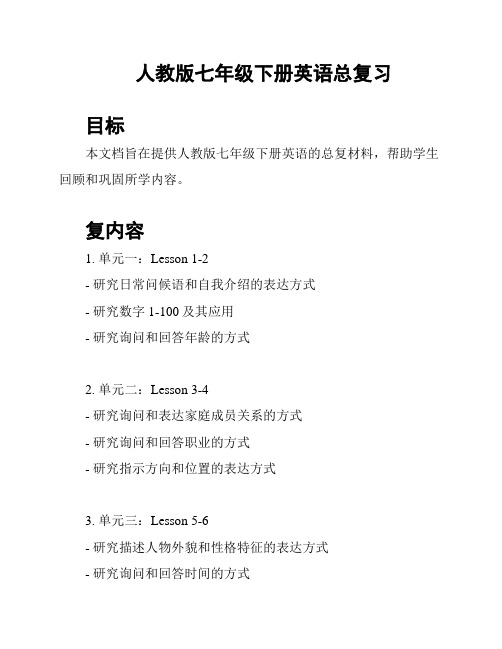
人教版七年级下册英语总复习
目标
本文档旨在提供人教版七年级下册英语的总复材料,帮助学生回顾和巩固所学内容。
复内容
1. 单元一:Lesson 1-2
- 研究日常问候语和自我介绍的表达方式
- 研究数字1-100及其应用
- 研究询问和回答年龄的方式
2. 单元二:Lesson 3-4
- 研究询问和表达家庭成员关系的方式
- 研究询问和回答职业的方式
- 研究指示方向和位置的表达方式
3. 单元三:Lesson 5-6
- 研究描述人物外貌和性格特征的表达方式
- 研究询问和回答时间的方式
- 研究表示频率的副词及其应用
4. 单元四:Lesson 7-8
- 研究描述人物喜好和日常活动的表达方式- 研究询问和回答能力和兴趣的方式
- 研究表达原因和结果的连词及其应用
5. 单元五:Lesson 9-10
- 研究描述家庭、房间和城市的表达方式- 研究询问和表达地点的方式
- 研究表示数量和价格的词汇及其应用
6. 单元六:Lesson 11-12
- 研究询问和回答日程安排的方式
- 研究表达喜怒和感受的形容词及其应用- 研究询问和表达能力和意愿的方式
复建议
- 复每个单元的重点词汇和常用句型
- 做相关单元的练题和听力练
- 跟读课文,注意语音和语调的准确性
- 制作复笔记,总结重点内容和常见问题- 参加口语练和模拟对话
祝愿同学们复习顺利,考试取得好成绩!。
典范英语初一下学期期中考试复习提纲

7—Book 10 Jellyfish ShoesWords(动词写原形):1.透明的see-through2.降落伞parachute 3。
叮,螫sting 4。
弄坏spoil 5。
海豚dolphin 6。
铲子,铲shovel 7。
难闻的pongy/ smelly 8.光秃秃的bare9。
困惑的puzzled10。
内疚的,有罪的guilty 11.可怕的horrible 12.水母jellyfish 13.散布开来spread14.温柔地,轻轻地gently15。
极小的tiny 16。
螺丝winkle 17。
真的honest18。
闪耀,闪烁sparkle 19.彩虹rainbow 20。
章鱼octopusPhrases (动词写原形)1。
当心watch out 2.很多loads of 3.用…做的be made of 4.别犯傻了don’t be silly5.摇了摇头shake one’s head 6。
垃圾袋bin bag 7。
踩,踏tread in8.噩梦bad dream 9.真走运What a bit of good luck!10.强迫某人make sb 11.情不自禁做某事can't help doing 12.改变主意change one’s mind 13。
究竟on earth14. 把…唤醒wake up 15.决不not ever 16.漂浮bob about17.举起lift up 18.上下颠倒tip up 19.铲起scoop up20.通往,导致lead to Sentences:1。
她对这双水母鞋非常引以为豪,它们看起来是粉红色,透明的就像树莓果冻。
She was really proud of them. They were pink and see—through like raspberry jelly.2。
咕嗤。
Laura踩到一些滑溜溜的东西。
人教版英语 初一(下)总复习资料(一)

七(下)期末总复习资料(一)I. 语法填空:1.I am __________ in the movie because it is very _____________(interest).2. I often ________(ride) to school ,but I ________ (take)a bus to school yesterday because my bike ________(not work).3. ______ he come from _____ European country?4. He _______ give his son so much money. He is only a kid. He can ___(is) in the club.5 She needn’t ________(sit) there for a long time. She doesn’t need ______(stand) there for long.6.Could you please help me clean the floor? Sorry, I ______ _______ __, but I’m busy now.7.Do you think he can sing __________(beautiful)? Would you like ________(any) water?8. I _______(stay) at home and did my homework..9. An English teacher is __(want) in our school. We want an English teacher ___ our school show.10.It _______________(not rain) yesterday, so we _________(visit) the farm.11.Could you please ________(tell) the little boy ______(call) me back?12. --Would you like _______(something) to drink? --Yes, just a little coke.13.---Do you often read books __ the evening?--Yes. But __ Saturday evening I usually watch TV.14. ( )If you want to learn English well, you should read _______ English ______.A. everyday; everyday.B. everyday; every day.C. every day; everyday.D. every day; every day.15. Two days ago, we showed the friends from the UK ________ our school, and we showed our English ____ them.16. It’s time __________(go) to school. It’s time for ________(he) _______(clean) the classroom.17. _________ Father’s Day Tim gives his father a big surprise.18. --Thank you a lot. --Not ____ _____. --Your coat is very beautiful. --_________.19. He did his homework every day.(否定句).He ______ _______ his homework every day.20.It often t_____ me about half an hour _____(ride) my bike to school. It’s 10 m________ walk.21. A quarter of the students _______(be) good at ________(play) basketball.Three quarters of the food ______(be) for you. I think the bike ride ____ him about a quarter. _______ often takes the boy half a day to clean his room22. My father made me ________ (停留)at home. (make sb. do sth.让某人做某事)23. He ________the bridge to school every day.=He goes _________the bridge...(cross)24. The ice cream tastes ____, but it’s not ___ for health. I like the beef soup because it ____ nice.25. Tom _________ (not have) a good time yesterday.26. He didn’t buy ___________(something) because he ___________(think) they were not cheap..27.--Your coat fits(适合) you well. --Thank you. I _____ (buy) I when I was on vacation.28. Could you please ________(not smoke) here? Tom would like _______(buy) a pair glasses.29. The sun _________(shine) ________(bright) now and the flowers are s__________ to us.30. ______ the farm, you can _______ the fresh air and ride a horse.31. Our teachers always ___________(worry) about our study last year.32. Look, the girl is ________ ________ the teacher carefully.33. The idea may work well. =________ the idea ________ well.34.The number of the ____________(dolphin) __________________(become变得) smaller now.35. Tom usually ___________(swim) in the afternoon, but now he ___________(study) math36. There is a boy _______(read) a book in the classroom.On the playground I can see many students _________(play)basketball.Look! All the students _____________(listen) to the teacher ____________(careful)_____ you _____(write) a letter to Tom now? --No, _____ _____. I ________(play) games.37. I like ___(giraffe) because they are very ____(beauty).I like ___(tiger) but I dislike ____(lion)38. ___(get) good grades, he often spends half an hour ____(remember) English words every day.Please tell him ________________(not arrive) late again.All the students are having a good time ________(exercise) on the playground.39. The boy is of medium ____________(high) and he is also of medium b____________.My father is old now and he doesn’t remember w_______. He always f_________.They are twin brothers, but they behave(表现) and speak quite _____________(different). 40. --What does his sister _______? --She is a beautiful girl with two big eyes.--What does his sister ________? --She enjoys different books.--______ ______ your favorite teacher like? --He is very friendly.41.Sam opened the door, ______(walk) out and _________(find) a lovely dog outside.Last week he _____________(teach) us ____________(swim) and I learned very quickly.He didn’t buy ___________(something) because he ___________(think) they were not cheap.He read the book and then ______(go) to bed early.--Your coat fits(适合) you well. --Thank you. I _____ (buy) I when I was on vacation.--Will you see the film Dead Men Tell No Tales with us tonight? --No, I ____(see) it last week.Tom _________ (not have) a good time yesterday because he ________(not free) all day long.He was very _________ when he saw the ________ movie.(scare).II. 阅读,理解,并填空:Hello, guys. My ________ is Jim Smith. I’m a school _______ of 12. Now I’m a __________ Seven student.I live in Mianyang, and my home is not far _______ my school. So I often go to school by bike. I think it’s a good exercise. Sometimes I w_________ to school, and sometimes I go to school ____ a bus. B_______ I never ________ my father’s car to school __________ he is as busy as a bee every day.______ _______(至于) my desk mate Peter, he usually ______ to school ______ his bike. _______ takes him about(大约)25 minutes to get to school. Sometimes he w________ to school. But he never _________ a bus to school because ________ ________ ________(没有) bus station(车站) near his home. We are good ___________(朋友). ______ Wednesday we often play basketball._______ do you go to school? Please tell me about it.III. 理解句意填空或用所给的单词正确形式填空:1. It is important ____ people _____ learn English.2. --What did you do on Sunday afternoon? –Oh, I ___________ to enjoy the sunshine.3. Linda felt very ______ after the long way, so he stopped to have a rest.4. There ____ some interesting news in yesterday’s newspaper.5. He wasn’t interested in seeing movies but his sister ____.6. Who cleaned the floor? Tom _____.7. He isn’t interested in seeing movies but his sister _____.8. You look very nice in your new dress today. –Oh, really? I ___ (buy)it when it was on sale.9. The story is very ______ and all of us are ______ in it.(interest)10. It _____ me about 10minutes to finish _______(paint) the walls last week.11. Nancy didn’t like her new shoes but now he ________.12. She said she returned(归还) the book to the library. I’m sure she _____.13. How was your vacation yesterday? --_____ ____ ____, we had a nice day.14. Last Sunday it _____(rain), so we didn’t go to the Great Wall.15. They ______(enjoy) themselves at the party last night.16. Li Lei practices ______(speak) English every day.17. He often goes to school on foot but yesterday he ______.18. I ______(fly) a kite two days ago and I _____ a good time.19. Look!There are two white _______ (mouse) in the box. They _______(eat) something.20. Everyone was _______ when they heard the _________ news. (excite).IV.用所给的单词正确形式填空:1. Do you like _______(talk) with him?2. Let’s go ________(swim). He has to ________(stay) in Beijing for two days.3. Look! The little girl __________(eat) an egg for breakfast.4. Listen! Many students __________(sing) an English song in the next room.5. I often ________(walk) to school with my best friend.6. My mother _______(like) fruit and my father _______(like)vegetables.7. Now we ____(study) in No. 2 Middle School.8. Do you want _______(help) the old man?9. I _________(have to) go to school on foot, but she ___________(not have to).10. Can you _______(come) and _______(tell) him ________(study) hard?11. We should _______(sit) down and have a rest(休息)12. He should _________(not give) so much money to her.13. When(当….的时候) I come in the room, my mom _________(read) a newspaper.14. Now my sister _________(write)a letter to her best friend.15. I hope you can _(带来) me the good news.16. Would you like to __(带)the book to Tom? V.用所给单词的正确形式填空:1. Please __ (tell) me about your favorite subject.2. Where __ Michael Owen __(come) from.?3. Sometimes(有时)the boy ____(be) late for school4. Tom often _____(teach) me_____(swim).5. He ____(want) ____ (look) for a job in town.6. She can’t ______(find) work in this town.7. Mary often ________(go) to school on foot, but yesterday he ________.8. Would you like _______(be) a professional football player?9. They _______ (pass) the ball from one to another.10. Let us _____(give) them our best wishes. ______(go) for it , Steal Roses!11. The woman often ______(take) a look at her cat to eat things.12. What is she doing? She _____(wash) dishes(盘子)13. What ____ he _______(have) to do on weekends? And what ____ he ____(do)last weekend? V. 动词填空专项练习(用所给动词的适当形式填空)1.What time _________ your father _________ (go) to work every day? He _________ (go) to work at about eight after _________ (have) breakfast.2. _________ they ________ (have) lunch at school? Yes. What ________ they _________ (have ) for lunch ? They often _________ (eat) some rice.3. Would you like _________ (go ) __________ ( shop) with me ? OK, I'd like ___________ (go) with you . What do you __________ (want) _________ (buy)? I want __________ (buy) some milk. My daughter_________ (enjoy)_________ (drink) milk.4. Lily ___________ (like) ___________ ( run ) in the morning , but she ___________ ( not like ) ____________ (run ) this morning .5. How many students in your class often __________ (take) a bus to school? Only one ___________ ( go ) to school by bus . The others _________ (ride) bikes .6. ____ Nick often _____ (do ) some reading in the library ? No, he ____ ( not read ) there .7. Can you _______ (use) a computer? Yes, I can.8._________ (not shout) in class. ________ (listen ) to the teacher carefully.9. My parents often tell me _______ (not play) computer games and __________ (study) hard.10. What about __________ (sit ) here ? OK, let me _________ (sit) here.11. He is a very good, let him _______ (help) you _______(water ) the trees.12. _____ all the students _____ (get) the books? Yes, every student ________( get )a book.13. Can he ________( park停车) his car here? No, he mustn't __________ (park) his car here. ___________ (look) at the sign "NO parking”!14. How much water _____ (be) there on the table? How many bottles of orange _______ (be) there on it?15. He ________________ (not want) ____________ (be) late for school, so he ___________ (get ) up early every morning.16. Some of the students in our class ______ (come) from Japan. One of them _______(come) from America.17. Thanks for ____________ (help ) me. Thanks for your _________(help).能力训练A teacher was asking a student a lot of questions, but the student couldn’t answer any of them. The teacher decided to ask him (21)___ questions so that he could get a few right. “Who was Beethoven(贝多芬)?” she asked.The student (22)____ for some time and then answered. “A king.”“(23)______. He was a musician.” The teacher said. She was getting a little (24)____ now, (25)____ she was trying not to show it.Then she asked, “Who was the first president(总统) of the United States?”The student thought for a long time, but he didn’ t say (26)_____. Then the teacher got very angry and (27)_____, “George Washington!” the student (28)____ and began to walk to the door. “Come back!” the teacher said, “I (29)_____ you go.”“Oh, I am (30)___.” The student said. “I thought you called the next student.”( )21. A. very good. B. very easy. C. more difficult. D. difficult.( )22. A. listened. B. thinks. C. thought. D. guessed.( )23. A. No. B. Yes. C. All right.. D. Maybe.( )24. A. happy. B. glad. C. young. D. angry.( )25. A. so. B. but. C. or. D. and.( )26. A. anything. B. nothing. C. something. D. everything.( )27. A. smiled. B. spoke. C. shouted. D. talked.( )28. A. get in. B. gets up. C. got off. D. got up.( )29. A. doesn’t let. B. didn’t let. C. can’t let. D. will not let.( )30. A. sorry. B. sad. C. happy. D. glad.III. Reading Comprehension(20points)AMrs. Lee had a young cat, and it was the cat’s first winter. One evening it was outside when itbegan to snow heavily. Mrs. Lee looked everywhere and called its name, but she did not find it, so she called the police and said, “I lost a small black cat. Did anyone find it?”“No, Madam, “said the policeman. “But the cats are really very strong animals. They sometimes live for days in the snow, and when it melts(融化) or someone finds them, they are all right.” Mrs. Lee felt happier when she heard that. “And”, she said, “Our cat is very clever. She almost(几乎) …”The policeman was getting tired. “Well, then, “ he said, “Why don’t you put your telephone down? Maybe she is trying to telephone you soon.”( )31. Mrs. Lee’s cat ____.A. was at home.B. was very old.C. didn’t know its name.D. was lost. ( )32. Where was the cat when it began to snow heavily?A. At home with Mrs. Lee.B. In the snow with other cats.C. It stayed outside.D. it ran everywhere happilyin the snow.( )33. The story happened(发生在) _____.A. on a winter evening.B. when the policeman was tired.C. when the snow melted.D. on one morning.( )34. The word “she” in the last sentence(句子) means _____.A. one of Mrs. Lee’s friends.B. one of the policemen.C. Mrs. Lee’s cat.D. the policeman’s wife.( )35. The policeman was getting tired because ____.A. he had to look for the cat.B. Mrs. Lee felt happier.C. the cat was very strong and it was hard to find it.D. Mrs. Lee talked too much to him on the phone.II. 翻译:1. 对许多学生来说,上学是很简单的______________________________________________2. 他对我就像父亲一样_______________________________________________3. 他们的梦想就是有一些书本________________________________________________4. 老师经常告诉我们不要在教室里跑______________________________________________5. 骑自行车要花多久呢?_________________________________________________6. 我想知道他喜欢什么____________________________________________________7. 我们不能够过分依赖父母,而应该是我们自己____________________________________8. 你要么赶公交车上学,要么走路上学_________________________________________9. 赶公交车上学经常花我25分钟(3ways)__________________________________________10. 恐怕他今天不做作业__________________________________________________1.房间里有一个男孩正在看电视_________________________________________________2.你的暑假现在怎么样?_________________________________________________3.春天绵阳天气温暖,夏天炎热。
七年级英语下Unit8知识点归纳与复习人教新目标版

新目标七年级下Unit 8 知识点归纳与复习单元知识清单一、重点单词:1. w ld 表示意愿2. n dle 面条3. b f 牛肉4. c bb ge 洋白菜5. p t t 土豆6. sp c l 特色菜7. dr nk 饮料8. l ge 大的9. s ze 大小10. b l 碗11. j ce 果汁12. d mpl 饺子13. p rr dge 粥14. t 茶15. r ce 米饭16. s p 汤17. f sh 鱼,鱼肉18. r s n 原因19. m n 菜单二、必会短语:1. like 想要2. a of 一碗……3. kind of 什么种类4. size 什么尺寸5. orange 橘汁6. tea 绿茶7. a menu 制定菜单8. nouns 可数名词9. nouns 不可数名词三、应知语法和句式:1. would like to do sth 想要做某事,如:想要吃面条would like noodles2. 提问种类时用:3. 提问号码、尺寸、大小时用:4. 要区别可数与不可数名词,如:一些牛肉八个土豆5. Monday的缩写形式是:知识点1 词语运用Ⅰ. 根据句意和首字母完成下列单词。
1. –What size dessert do you want?-A l one.2. Annie can’t have dinner with us. Do you know the r?3. I have b every day. This kind of meat is good for our health.4. Is there any orange j in the bottle?5. I want a large size bowl of rice but for my brother a m one is enough (足够的).6. I’m very thirsty, please give me something to d.7. I’d like a bowl of noodles with o.8. There are many v in the market.9. He often goes to the house of noodle and o a large bowl of noodle.10. I like black shoes in this s . I think they are not big or too small for me.Ⅱ.根据汉语提示及句意完成句子。
七年级英语下册1-3单元复习资料
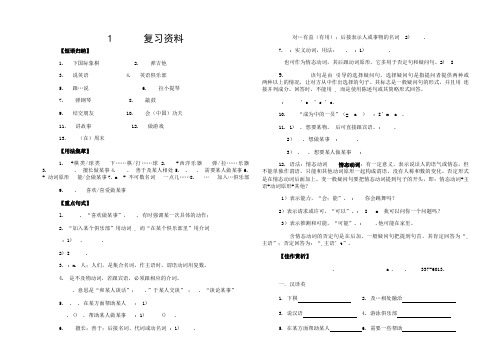
1 复习资料【短语归纳】1. 下国际象棋2. 弹吉他3. 说英语4. 英语俱乐部5. 跟…说6. 拉小提琴7. 弹钢琴 8. 敲鼓9. 结交朋友 10. 会(中国)功夫11. 讲故事 12. 做游戏13. (在)周末【用法集萃】1. +棋类/球类下……棋/打……球2. +西洋乐器弹/拉……乐器3. . 擅长做某事4. . 善于及某人相处5. . . 需要某人做某事6. + 动词原形能/会做某事7. a + 不可数名词一点儿……8. … 加入…俱乐部9. . 喜欢/喜爱做某事【重点句式】1. . “喜欢做某事”, . 有时强调某一次具体的动作;2. “加入某个俱乐部”用动词 , 而“在某个俱乐部里”用介词: 1) . .2) I .3. : n. 人;人们,是集合名词,作主语时,谓语动词用复数。
4.是不及物动词,若跟宾语,必须跟相应的介词。
. 意思是“和某人谈话”; .”于某人交谈”; . “谈论某事”5. . . 在某方面帮助某人: 1). () . 帮助某人做某事 : 1) () .6. 擅长;善于;后接名词、代词或动名词 : 1) .对…有益(有用);后接表示人或事物的名词 2) .7. : 实义动词,用法: . : 1) .也可作为情态动词,其后跟动词原形,它多用于否定句和疑问句。
2) I9.该句是由引导的选择疑问句。
选择疑问句是指提问者提供两种或两种以上的情况,让对方从中作出选择的句子。
其标志是一般疑问句的形式,并且用连接并列成分。
回答时,不能用 , 而是使用陈述句或其简略形式回答。
: ’s’s ’s.10. “成为中的一员”(= a ): I’m a .11. 1) . 想要某物。
后可直接跟宾语。
: .2) . 想做某事 : .3) . . 想要某人做某事 :12. 语法:情态动词情态动词:有一定意义,表示说话人的语气或情态,但不能单独作谓语,只能和其他动词原形一起构成谓语,没有人称和数的变化。
七年级英语下册(1-6)复习提纲-经典教学教辅文档
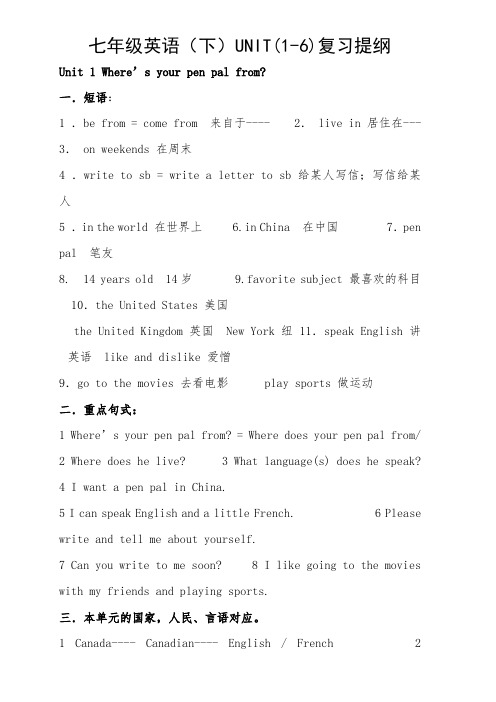
七年级英语(下)UNIT(1-6)复习提纲Unit 1 Where’s your pen pal from?一.短语:1 .be from = come from 来自于---- 2. live in 居住在--- 3. on weekends 在周末4 .write to sb = write a letter to sb 给某人写信;写信给某人5 .in the world 在世界上 6.in China 在中国 7.pen pal 笔友8. 14 years old 14岁 9.favorite subject 最喜欢的科目10.the United States 美国the United Kingdom 英国New York 纽11.speak English 讲英语like and dislike 爱憎9.go to the movies 去看电影play sports 做运动二.重点句式:1 Where’s your pen pal from? = Where does your pen pal from/2 Where does he live?3 What language(s) does he speak?4 I want a pen pal in China.5 I can speak English and a little French.6 Please write and tell me about yourself.7 Can you write to me soon? 8 I like going to the movies with my friends and playing sports.三.本单元的国家,人民、言语对应。
1 Canada---- Canadian---- English / French 2France------ French------French3 Japan------Japanese----Japanese4 Australia----Australian----- English5 the United States------ American---- English6 the United Kingdom---British----- EnghishUnit 2 Where’s the post office?一.A sking ways: (问路)1.Where is (the nearest) ……?(比来的)……在哪里?2.Can you tell me the way to ……?你能告诉我去……的路吗?3.How can I get to ……?我怎样到达……呢?4.Is there …… near here / in the neighborhood? 附近有……吗?5.Which is the way to ……?哪条是去……的路?二.Showing the ways: (指路)1. Go straight down / along this street. 沿着这条街不断走。
七年级下学期英语各章节重要内容归纳

七年级下学期英语各章节重要内容归纳第一章:学校生活- 学科和教室- 学校设施和设备- 学校规则和制度- 课程时间表和课堂活动第二章:我的家庭- 家庭成员和亲戚关系- 家庭成员的职业和兴趣爱好- 家庭规则和家庭活动- 家庭成员之间的相处方式第三章:我的城市- 城市名称和地理位置- 城市景点和旅游景点- 城市交通和交通方式- 城市的文化和传统第四章:我的课余活动- 研究和爱好- 校外活动和俱乐部- 社交媒体和娱乐活动- 个人兴趣和追求第五章:购物和服装- 商店和市场- 购物的常用英语表达- 服装和时尚趋势- 参观商店和挑选服装第六章:健康和运动- 健康惯和饮食- 锻炼和运动方式- 平衡研究和休息- 保持健康的重要性第七章:节日和庆祝活动- 重要节日和传统俗- 节日庆祝活动和食物- 节日的意义和重要性- 节日庆祝的方式和惯第八章:环境保护- 环境问题和污染- 环境保护的重要性- 减少污染的方法和措施- 环境友好的生活方式第九章:世界各地的人们- 不同国家和地区的人们- 语言和文化差异- 人们的生活方式和传统- 尊重和理解不同文化背景的重要性第十章:未来的计划和梦想- 个人目标和职业梦想- 未来计划和学业规划- 实现梦想的方法和步骤- 努力和坚持的重要性以上是七年级下学期英语各章节的重要内容归纳。
每个章节都涉及不同主题,帮助学生了解和掌握相关的词汇和表达。
学生可以通过学习这些内容来提高英语水平和跨文化交流能力。
人教版七年级英语下册期末复习资料全册
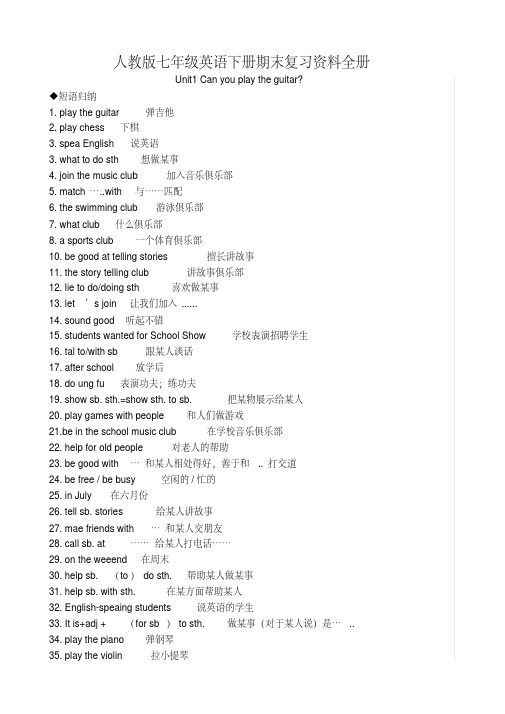
人教版七年级英语下册期末复习资料全册Unit1 Can you play the guitar?◆短语归纳1. play the guitar 弹吉他2. play chess 下棋3. spea English 说英语3. what to do sth 想做某事4. join the music club 加入音乐俱乐部5. match…..with 与……匹配6. the swimming club 游泳俱乐部7. what club 什么俱乐部8. a sports club 一个体育俱乐部10. be good at telling stories 擅长讲故事11. the story telling club 讲故事俱乐部12. lie to do/doing sth 喜欢做某事13. let’s join 让我们加入......14. sound good 听起不错15. students wanted for School Show 学校表演招聘学生16. tal to/with sb 跟某人谈话17. after school 放学后18. do ung fu 表演功夫;练功夫19. show sb. sth.=show sth. to sb. 把某物展示给某人20. play games with people 和人们做游戏21.be in the school music club 在学校音乐俱乐部22. help for old people 对老人的帮助23. be good with…和某人相处得好,善于和..打交道24. be free / be busy 空闲的/忙的25. in July 在六月份26. tell sb. stories 给某人讲故事27. mae friends with…和某人交朋友28. call sb. at ……给某人打电话……29. on the weeend 在周末30. help sb.(to) do sth. 帮助某人做某事31. help sb. with sth. 在某方面帮助某人32. English-speaing students 说英语的学生33. It is+adj +(for sb) to sth. 做某事(对于某人说)是…..34. play the piano 弹钢琴35. play the violin 拉小提琴36. the Students’ Sports Center学生运动中心37. need help to teach music 需要帮助做某事38. need sb. to do sth 需要某人做某事39. teach sb. to do sth 教某人做某事40. be in our school music festival 参加我们学校的音乐节◆用法集萃1. play +棋类/球类下…棋/打…球2. play the +西洋乐器弹/拉…乐器3. be good at doing sth.= do well in doing sth. 擅长做某事4. be good with sb. 和某人相处地好5. need sb. to do sth. 需要某人做某事6. can + 动词原形能/会做某事7. a little + 不可数名词一点儿…8. join the…club 加入…俱乐部9. lie to do sth. =love to do sth. 喜欢/喜爱做某事◆典句必背1. —Can you draw? 你会画画吗?—Yes, I can./No, I can’t. 是的,我会。
初一英语下学期英语100句【复习资料】
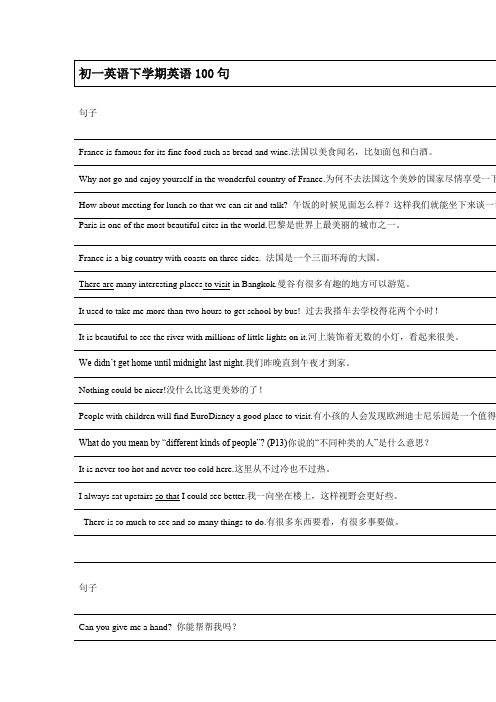
句子France is famous for its fine food such as bread and wine.法国以美食闻名,比如面包和白酒。
Why not go and enjoy yourself in the wonderful country of France.为何不去法国这个美妙的国家尽情享受一下How about meeting for lunch so that we can sit and talk? 午饭的时候见面怎么样?这样我们就能坐下来谈一谈Paris is one of the most beautiful cites in the world.巴黎是世界上最美丽的城市之一。
France is a big country with coasts on three sides. 法国是一个三面环海的大国。
There are many interesting places to visit in Bangkok.曼谷有很多有趣的地方可以游览。
It used to take me more than two hours to get school by bus! 过去我搭车去学校得花两个小时!It is beautiful to see the river with millions of little lights on it.河上装饰着无数的小灯,看起来很美。
We didn’t get home until midnight last night.我们昨晚直到午夜才到家。
Nothing could be nicer!没什么比这更美妙的了!People with children will find EuroDisney a good place to visit.有小孩的人会发现欧洲迪士尼乐园是一个值得What do you mean by “different kinds of people”? (P13)你说的“不同种类的人”是什么意思?It is never too hot and never too cold here.这里从不过冷也不过热。
七年级英语下册-全册知识点梳理
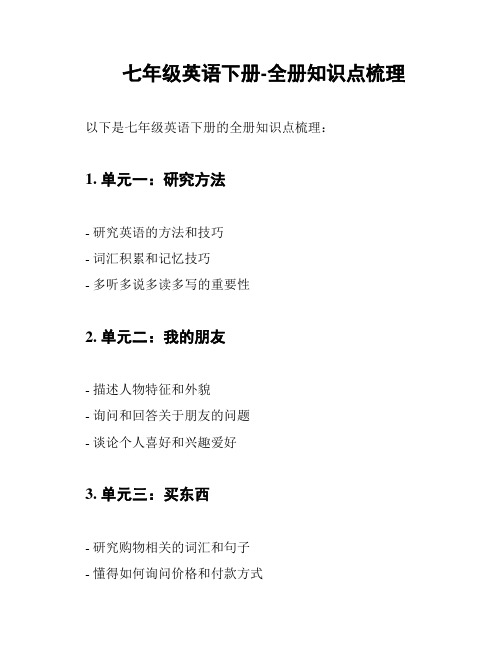
七年级英语下册-全册知识点梳理以下是七年级英语下册的全册知识点梳理:
1. 单元一:研究方法
- 研究英语的方法和技巧
- 词汇积累和记忆技巧
- 多听多说多读多写的重要性
2. 单元二:我的朋友
- 描述人物特征和外貌
- 询问和回答关于朋友的问题
- 谈论个人喜好和兴趣爱好
3. 单元三:买东西
- 研究购物相关的词汇和句子
- 懂得如何询问价格和付款方式
- 学会表达自己的购物意愿和偏好4. 单元四:我的学校
- 研究学校相关的词汇和句子
- 描述学校和课堂环境
- 谈论研究内容和学科
5. 单元五:我的生活
- 研究日常生活相关的词汇和句子- 描述自己的生活惯和家庭
- 谈论日常活动和时间安排
6. 单元六:我的假期
- 研究度假和旅行相关的词汇和句子- 描述过去和将来的假期计划
- 谈论旅行经历和感受
7. 单元七:我喜欢运动
- 研究运动项目和运动器材的词汇
- 喜欢和不喜欢的表达方式
- 谈论个人的体育运动经验和兴趣爱好
这份文档梳理了七年级英语下册的全册知识点,希望对你的学习有所帮助。
- 1、下载文档前请自行甄别文档内容的完整性,平台不提供额外的编辑、内容补充、找答案等附加服务。
- 2、"仅部分预览"的文档,不可在线预览部分如存在完整性等问题,可反馈申请退款(可完整预览的文档不适用该条件!)。
- 3、如文档侵犯您的权益,请联系客服反馈,我们会尽快为您处理(人工客服工作时间:9:00-18:30)。
初一下学期英语复习资料Unit 1 Where’s your pen pal from?(你的笔友来自哪?)重点词汇:be from= come from 来自...pen pal=pen friend 笔友like and dislike 好恶;爱憎live in….在...居住speak English 讲英语play sports 做体育运动a little French 一些法语go to the movies 去看电影an action movie 一部动作片on weekends 在周末Excuse me 对不起,打扰get to 到达、抵达beginning of 在...开始的时候at the end of 在...结束的时候arrive at 到达小地点arrive in 到达大地点二、重点句型(1)、Where+be+主语+from?=Where+do/does+主语+come?(询问某人来自哪里)主语+be+from+地点=主语+come+from+地点(2)、Where do/does+主语+live?主语+live/lives in…(3)、What language do/does +主语+speak?主语+speak/speaks….(4)、主语+like/likes+doing…Unit 2 Where’s the post office(邮局在哪里?)重点词汇:post office 邮局pay phone 投币式公用电话next to 在...隔壁across from 在...对面in front of 在...前面between…and… 在...和...之间on a street 在街上in the neighborhood 在附近on the right/left 在右边/在左边on one’s right/left 在某人的右边/左边turn right/left 向右/左转take a walk 散步have fun 玩得开心the way to …去...的路take a taxi 打的/乘出租车go down(along)…沿着...走go through...穿过...have a good trip 旅途愉快二、重点句型(1)、Is there a bank near here?(这附近有一家银行吗?)Yes,there is .It’s on Centre Street.(是的,有的。
它在中心大街上)No,there isn’t.(不,没有)(2)、Where’s the sumpermarket?(超市在哪里?)It’s next to the library.(它在图书馆的旁边。
). (3)、Bridge Street is a good place to have fun.(大桥街是个好玩的地方。
)(4)、I hope you have a good trip.(我希望你旅途愉快。
)(5)、If you are hungry,you can buy food in the restaurant.(如果你很饿,你可以在餐馆里买一些食物。
)(6)、Talk a walk though the park.(交谈着走过公园。
)(7)、enjoy后接名词或动词-ing形式.Do you enoy(=like) your work?Do you enjoy(=like) living in the city?Unit 3 Why do you like koalas?(你为什么喜欢考拉)重点词汇:want to do sth .想要做某事want sb to do sth 想要某做某事want sth 想要某物Let sb do sth 让某人做某事kind of 有几分\种类a kind of 一种……years old …年龄如:ten years old 十岁like to do sth 喜欢做某事like doing sthplay with … 与...一起玩be quiet 安静during the day 在白天at night 在夜间have a look at.. 看...one…the other 一个...另一个...二、重点句型(1)、-why do you like pandas?(你为什么喜欢熊猫?)-Because they’re very cure.(因为他们很可爱。
)(2)、-Why dose he like koalas?(你为什么喜欢考拉?)-Because they are kind of interesting.(因为它们是有趣的。
)(3)、-Where are lions from?(狮子来自哪里?)-Lions are from South Africa.(狮子来自南非。
)(4)、-What animals do you like?(你喜欢什么动物。
)-I like elephants.(我喜欢大象。
)Unit 4 I want to be an actor.(我想成为一名医生.)重点词汇:want to be+职业想要成为shop assistant 店员bank clerk 银行职员work with 与。
一起工作work hard 努力工作work for 为。
而工作work as 作为。
而工作get.. from…从。
获得。
give sth.to.sb /give.sb.sth 把某物给某人正确的表示:give it/them to sb.错误的表示:give sb.it/themin the day 在白天at night 在夜间talk to /with 与…讲话go out to dinners 外出吃饭in a hospital 在医院newspaper reporter 报社记者movie actor 电影演员二、重点句型(1)-What do/does+某人+do?(询问某人的职业)例:-What do you do?-I’m a student.(你是做什么的?-我是一名学生。
)-What dose he do? He’s a teacher.(他是做什么的?他是一名老师。
)(2)-What do/does+某人+want to be?(询问某人想做什么?)例:What do you want to be?-I want to be a teacher.你想成为什么?-我想成为一名老师。
)-What does she want to be ?(她想成为什么?)She want to be a nuser.(她想成为一名护士。
)(3)-Where does your sister work?(你妹妹在哪里工作?)-She works in a hospital.(她在医院里工作。
)(4)-Does he work in the hospiat(他在医院里工作吗?)Yes.he does/No,he doesn’t(是的,他在)/(不,他不在)(5)-Does she work late?(她工作很晚吗?)-Yes,she does/No.she doesn’t(她是的)/(不,她不是)(6)-英语中询问职业的几种表达方式:What do/does …do?(…是做什么的?)What is…? What is your father?(你父亲是什么?)What’s one’s jo b?例:What’s your father’s job?(你父亲的职业是什么?)Unit 5 I’m watching TV.(我正在看电视.)重点词汇:do homework 做家庭作业watch TV 看电视eat dinner 吃饭;就餐clean the room 打扫房间read newspaper/a book 看报纸/看书go to the movies 看电影write a letter 写信wait for 等待;等候talk about 谈论。
play basketball/soccer/ 打篮球/踢足球take photos 拍照TV show 电视节目Some of。
中的一些a photo of my family 我的家庭照at school 在学校be with 和。
一起in the tree 在树上二、重点句型(1)-What+be+主语+doing? ….正在做什么?-主语+be+doing。
…正在做某事。
例:-what are you doing?-I’m doin g my homework.(2)-Thanks for … 为。
而感谢例:Thanks for your letter.(谢谢你的来信。
)(3)-Here are/is…(这里有…)例:Here are some of my photos.(这里有一些我的照片。
)Here is a photo of my family.(这里有一张我家庭照片。
)(4)-That sounds good.(那听起来很棒。
)(5)-This TV show is boring.(这个TV秀是无聊的。
)三、时态语法:现在在进行时的形式:助动词be(am,is,are)+动词-ing形式(也叫现在分词),表示现在(说话的瞬间)正在进行或发生的动作。
2)现在进行时的肯定句形式主语+be(am,is,are)+动词现在分词+其他I’m watching TV.3)现在进行时的否定句形式主语+be(am,is,are)+not+动词现在分词+其他They are not playing soccer.4)现在进行时的一般疑问句形式及回答:Is(am,are)+主语+动词现在分词+其他?Yes,主语+is/am/are. No,主语+isn’t/aren’t/am not.Are you reading? Yes,I am. No,I am not.5) 现在进行时的特殊疑问句形式:特殊疑问词+is/am/are+主语+现在分词+其他?例:What is your brother doing?6) 动词+ing形式(现在分词)的构成.1一般情况下在动词词结尾加-ing.如: eat--eating, do—doing,clean—cleaning,play—playing,2以不发音的元音字母e结尾的动词,先去掉e再加-ing.如:take--taking,write—writing,have-havingcome—coming.dance--dancing3词尾如果是以一个辅音字母结尾的重读闭音节词.应该先双写这个辅音字母,再加-ing.如:run—running,sit—sitting ,swim—swimming.Shop—shopping. put—putting, sit—sittingUnit 6:It’s raining!(下雨了!)重点词汇:Around The World 世界各地On vacation 度假Take photos 拍照On the beach 在海边a group of people 一群人play beach volleyball 打沙滩排球be surprised 惊讶的be surprised at sth./sb.对某人或某人感到惊讶in this heat 在酷暑中be relaxed 放松have a good time 玩得很痛快in different kind of weather 在不同的天气里Thank sb for(doing)sth由于(做)某事而感谢某人How’s it going? 近况如何Some…others…一些…另一些…Look like..看起来像。
